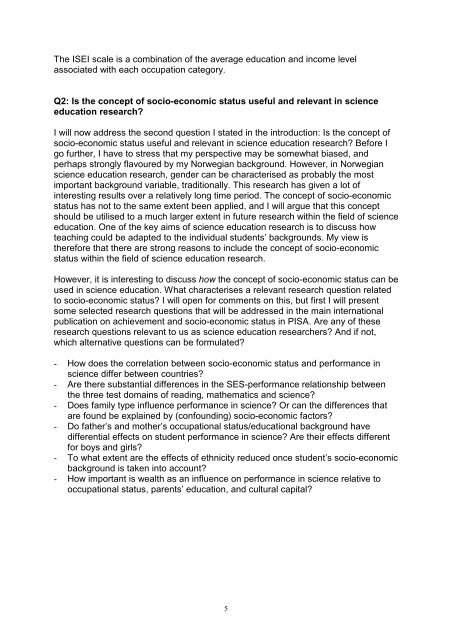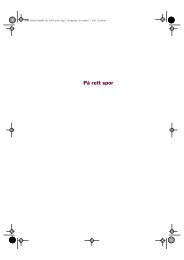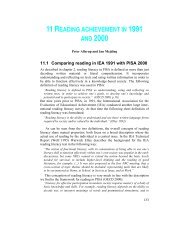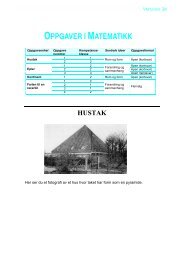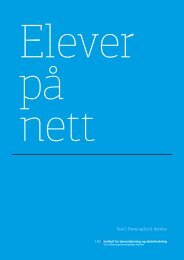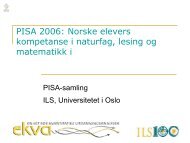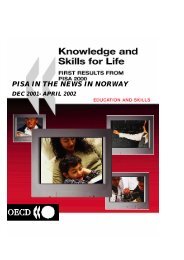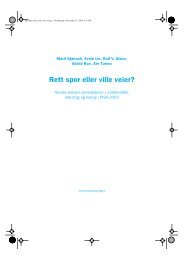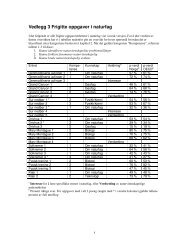Science achievement and socio-economic status: A ... - Pisa
Science achievement and socio-economic status: A ... - Pisa
Science achievement and socio-economic status: A ... - Pisa
Create successful ePaper yourself
Turn your PDF publications into a flip-book with our unique Google optimized e-Paper software.
The ISEI scale is a combination of the average education <strong>and</strong> income levelassociated with each occupation category.Q2: Is the concept of <strong>socio</strong>-<strong>economic</strong> <strong>status</strong> useful <strong>and</strong> relevant in scienceeducation research?I will now address the second question I stated in the introduction: Is the concept of<strong>socio</strong>-<strong>economic</strong> <strong>status</strong> useful <strong>and</strong> relevant in science education research? Before Igo further, I have to stress that my perspective may be somewhat biased, <strong>and</strong>perhaps strongly flavoured by my Norwegian background. However, in Norwegianscience education research, gender can be characterised as probably the mostimportant background variable, traditionally. This research has given a lot ofinteresting results over a relatively long time period. The concept of <strong>socio</strong>-<strong>economic</strong><strong>status</strong> has not to the same extent been applied, <strong>and</strong> I will argue that this conceptshould be utilised to a much larger extent in future research within the field of scienceeducation. One of the key aims of science education research is to discuss howteaching could be adapted to the individual students’ backgrounds. My view istherefore that there are strong reasons to include the concept of <strong>socio</strong>-<strong>economic</strong><strong>status</strong> within the field of science education research.However, it is interesting to discuss how the concept of <strong>socio</strong>-<strong>economic</strong> <strong>status</strong> can beused in science education. What characterises a relevant research question relatedto <strong>socio</strong>-<strong>economic</strong> <strong>status</strong>? I will open for comments on this, but first I will presentsome selected research questions that will be addressed in the main internationalpublication on <strong>achievement</strong> <strong>and</strong> <strong>socio</strong>-<strong>economic</strong> <strong>status</strong> in PISA. Are any of theseresearch questions relevant to us as science education researchers? And if not,which alternative questions can be formulated?- How does the correlation between <strong>socio</strong>-<strong>economic</strong> <strong>status</strong> <strong>and</strong> performance inscience differ between countries?- Are there substantial differences in the SES-performance relationship betweenthe three test domains of reading, mathematics <strong>and</strong> science?- Does family type influence performance in science? Or can the differences thatare found be explained by (confounding) <strong>socio</strong>-<strong>economic</strong> factors?- Do father’s <strong>and</strong> mother’s occupational <strong>status</strong>/educational background havedifferential effects on student performance in science? Are their effects differentfor boys <strong>and</strong> girls?- To what extent are the effects of ethnicity reduced once student’s <strong>socio</strong>-<strong>economic</strong>background is taken into account?- How important is wealth as an influence on performance in science relative tooccupational <strong>status</strong>, parents’ education, <strong>and</strong> cultural capital?5


